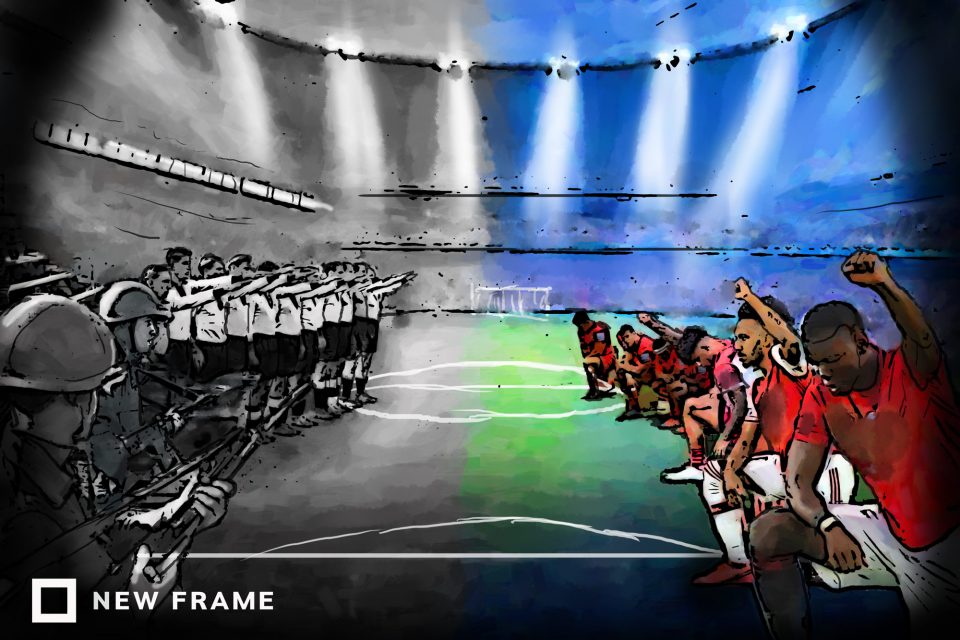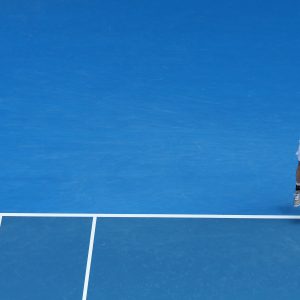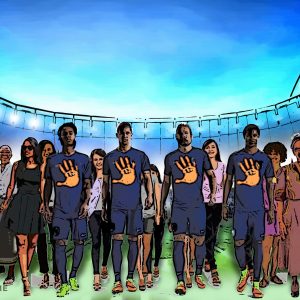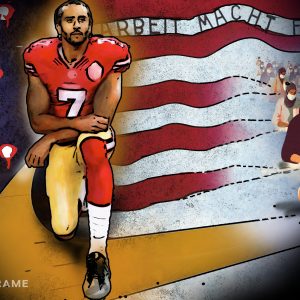The dark side of sport’s power
There are alarming examples all around us of sport, its heroes and those who milk its cash cows being cloaked in admiration when they deserve our harshest scorn.
Author:
18 June 2021

The power that sport wields over us is a lot like dynamite. It can break down boulders of oppression and clear paths that were no-go areas for certain people. But in the wrong hands, it’s deadly.
The Copa América that’s under way in Brazil amid the devastation of Covid-19 and the insistence of the International Olympic Committee (IOC) that the Olympics will go ahead in Japan “barring an Armageddon” are perfect examples.
Health experts, athletes and citizens of these countries have heavily criticised the decisions to put sport ahead of people’s lives. But their protests and scientific arguments count for nothing when compared with the billions the IOC will make from staging the Olympic Games, where almost 100 000 people from across the world will converge on Tokyo.
For Brazilian President Jair Bolsonaro, hosting South America’s grand football tournament is a vanity project and an attempt to win back the support he has lost because of his regime’s abysmal handling of Covid-19. It is why Brazil was swift to take over the hosting duties that were stripped from Colombia owing to protests and from Argentina because of the effects of Covid-19.
Related article:
In a perverted way, hosting an event that’s a superspreader of the coronavirus to counter poorly handling the pandemic, which has killed almost 500 000 Brazilians, can go a long way towards boosting Bolsonaro’s waning popularity, especially if the national team (who have also criticised the decision to host the tournament) wins. That victory wouldn’t just be Brazil’s, it would be Bolsonaro’s, as he would hand over the trophy to the captain and that image would be used to fuel his propaganda machinery.
That’s how powerful sport is. Authoritarian regimes, sport apparel companies whose clothes are made in sweatshops and activists have all used this power to their benefit. In South Africa, the National Party and the anti-apartheid movement both saw sport as an important vehicle to drive their message. The Nats used rugby to push their propaganda of Afrikaner nationalism, while the South African Council on Sport, under the banner of no normal sport in an abnormal society, hit apartheid South Africa where it hurt with the sport boycott that led to the country being banned from the international arena.
Above all, the club
With no national team to cheer until 1992, football clubs held great power in South Africa. And with the beautiful game also standing up to the system, whether it was having racially diverse teams when race was the only barometer for selection in other sporting codes, or using football matches as cover for political gatherings, the sport became more than just a pastime – it also grew into an extension of the struggle and South African identity. Its inclusiveness and accessibility, needing just a strip of land and willing participants to host a football match, played a key role in its growth. So loyalty to the club was, and always has been, imperative, and that loyalty included defending the club no matter the crime.
Almost three decades since readmission, clubs still hold great sway in South Africa. The club comes first and then the national team, leading to situations where Bafana Bafana is watched by eyes that are tinted with club allegiances rather than national unity. And no club is more powerful, successful and supported than Kaizer Chiefs. In fact, no sporting institution in the country – club or national team – has the same pull as Amakhosi, with their millions of followers all over southern Africa.
With that power comes an enormous social responsibility. Kaizer Motaung, who formed the club when he was just 26 in 1970, understood that. This behemoth was an important symbol during the struggle against apartheid, selling itself as the Glamour Boys by flaunting a lifestyle that the oppressive regime didn’t deem fit for Black people, who were viewed as nothing more than the help.
The club has always been conscious of the political situation. Chiefs, with its rival Orlando Pirates, used the Vodacom Challenge as a vehicle to not only promote pan-Africanism but also mend relationships in KwaZulu-Natal, where political violence between Inkatha (later the Inkatha Freedom Party) and the ANC left many dead, even after democracy. Amakhosi have always used their immense power to promote positive messages. In an interview with Motaung on overcoming the scourge of gender-based violence, he insisted that “football has to take the lead” just like it did in the struggle against apartheid.
Related article:
This is why it wasn’t only disappointing but also despicable when the same club, whose ethos includes taking “responsibility for personal actions”, announced that it had hired Stuart Baxter as its coach. The British coach was fired in India for saying his players have to rape or get raped for them to win a penalty. Just like India, South Africa has a rape crisis. It’s not only the inept police service or the flawed justice system that allows rape to thrive in South Africa. Primarily, it is rape apologists who defend such a henious crime and turn a blind eye when confronted with the truth who also make South Africa an unsafe place for women.
Even before women step outside their homes – where their safety is still not guaranteed – for a simple run, they must carefully plan their route, arm themselves with pepper spray and bravery, and tamp down their overwhelming fear of attack and rape. While some gave up a long time ago because of how unsafe it can be, those who still brave it have to consider when it will get dark (even though daylight offers a false sense of security), whether the clothes they are wearing are “too revealing” and their escape routes should any man along their path threaten them. It’s exhausting, even before they begin to run.
In a country like this, there should be no place for men like Baxter. Amakhosi thought otherwise, hiring Baxter knowing full well the response his appointment would elicit. They also knew that many in their army of followers will defend Baxter – this is, after all, the man who brought the glory to Naturena that has eluded the club since he left Chiefs in 2015.
Reading between the lines
How Amakhosi announced the hire of Baxter was telling. The club posted two audio files of him in the Premier Soccer League’s WhatsApp group, to which South African football journalists and clubs’ media officers belong. The first was an interview with Chiefs’ corporate communications manager, Vina Maphosa, in which Baxter talked about his relationship with South Africa and return to Amakhosi. In neither that interview nor the statement that announced his return were his unsavoury comments in India addressed. The club has also not done media engagements with the coach or explained why it hired him despite his utterances.
But in the second audio file, which sounded like it was recorded in an empty church, Baxter said: “Given the unfortunate nature of my exit in India, and the unfortunate comments and – to be very honest – stupid comments that I made, I felt strongly that I needed to make another apology before recommencing my work in South Africa.
“Anything that I said that offended anybody, I humbly apologise. I know that it is a heinous crime [and] it looked like I was making light off [of it]. I was not, I was not. That was absolutely not my intention. That does not reflect me as a person. But I do know that many people were upset and for that I am truly sorry. In the future, there will not be an issue with me making such clumsy, unsensitive [sic] and downright stupid comments. I really hope that anyone that was offended by my insensitive words will accept this really heartfelt apology.”
Related article:
This reflected something that sport reporting unconsciously does: separating the man from the sporting legend. The man is flawed, he commits crime and says stupid things while the sporting legend is a gift from the gods. There are not enough adjectives in the dictionary to describe his excellence. The flawed man is put on the front pages of newspapers, where all of humanity’s flaws are laid bare. The sporting legend is in the back pages, where human excellence is celebrated.
This creates a means or buffer for supporters to celebrate their idols regardless of what they have done or said. Mike Tyson is only a convicted rapist on the front pages; on the back pages he is the baddest man alive and one of the best heavyweight boxers in the history of the sport, which is why he is still celebrated and people gush when he plays with pigeons or makes cameos in movies. The back pages maintain the myth. It’s the same for stars such as Cristiano Ronaldo, Kobe Bryant and many more.
Excusing violence
This dual identity is dangerous because it perpetuates the narrative that only a certain type of man commits these crimes. One of the arguments from Ronaldo’s defenders when the rape accusations against him resurfaced was why such a good-looking man with money, who can get any woman he desires, would want to rape?
“Excuses make violence against women possible. They are part of the complicated network that says women are not human, so our pain is generalised, unimportant, so we give violent men permission to keep all those they deem vulnerable, such as women, men and gender non-conforming people or children,” Pumla Dineo Gqola writes in Rape: A South African Nightmare.
“When we make excuses we become the perpetrators and their allies. It is important to redefine what justice means, recognising that it lies not in political speeches, the mention of non-sexism at the bottom of stationery. For many women it is not in the criminal justice system.”
We need to consistently show that the flawed man and sporting genius are one, because the separation of the two makes it easier to ignore and stomach our heroes’ transgressions.
Related article:
Baxter’s appointment also brought an important question to the fore: Why is it easy for South African men to stand up and harshly criticise acts of racism, but when it comes to rape, sexual harrasment or gender-based violence their noise and urgency aren’t the same nor are they sustained?
Luc Eymael is banned from coaching South Africa, and his two attempted coaching appointments by Chippa United were met with strong criticism. Eymael compared fans in Tanzania to monkeys and dogs. But when Baxter, who trivialised rape, was appointed, the same urgency and outrage weren’t there. The South African Football Association – which banned Eymael – defended its president, Danny Jordaan, when he was accused of rape and told KickOff magazine that Baxter was cleared to work in the country because he apologised, “so there are no issues”.
Sport has immense power to address social ills. It has played an important role in bringing uncomfortable conversations to the fore and stars have used their influence and power to bring about positive change. But that power is also often abused in the knowledge that loyalty to the star, coach or club and love for the game will outweigh any despicable acts.
That’s why, despite the objections, the Copa América was always going to go ahead in a country that has the world’s third-highest Covid-19 fatality rate. It is also why the Olympics will not only go ahead but be watched by billions. And why Baxter’s appointment is celebrated by many Chiefs supporters.




